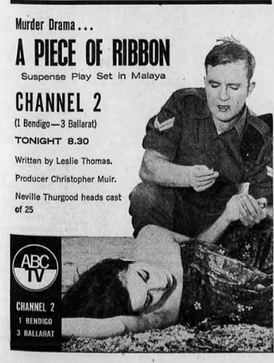
Neva Carr Glyn or Neva Carr Glynn was an Australian stage, film and radio actress born in Melbourne to Arthur Benjamin Carr Glyn, a humorous baritone and stage manager born in Ireland, and Marie Carr Glyn, née Marie Dunoon Senior, an actress with the stage name "Marie Avis". She had one half-sister Gwendoline Arnold O'Neill and two half-brothers Sacheverill Arnold Mola and Rupert Arnold Mola. She was named "Neva" after a great-aunt, who was a contralto of some quality. Both spellings of her surname appear in print roughly equally and apparently arbitrarily.
If It's a Rose is an Australian television movie, or rather a live television comedy play, which aired in 1958 on ABC. Australian TV drama was relatively rare at the time.
Jenny is a 1962 Australian TV drama.
The Proposal is a 1957 Australian television play based on the play A Marriage Proposal by Anton Chekhov. It was made at a time when Australian drama production was rare and mostly adaptations of overseas shows.
Outpost is a 1959 Australian television play about Australian soldiers in New Guinea during World War Two. It was written for television by John Cameron.

A Piece of Ribbon is a 1963 Australian television play filmed. It was based on an English TV play by Leslie Thomas that had already been performed by the BBC.
Christopher Muir was an Australian director and producer, notable for his work in TV in the 1950s and 1960s. In the 1980s he was head of ABC Television drama.
Eye of the Night is a 1960 Australian television play. It was written by Kay Keavney and directed by Christopher Muir.

Uncle Martino is a 1960 Australian television play. It was directed by Christopher Muir from a play by Guido Cantini.
Marriage Lines is a 1962 Australian television play directed by Christopher Muir.
The First Joanna is a 1943 play by Dorothy Blewett that was adapted for radio and television.

Fury in Petticoats is a 1962 television play broadcast by the Australian Broadcasting Corporation. It was directed by Christopher Muir. It was based on a play which had been filmed by British TV the year before.
The Ambitious Servant Girl is a 1962 TV play broadcast by the Australian Broadcasting Corporation. It was an opera and was directed by Christopher Muir. Australian TV drama was relatively rare at the time.

Six Characters in Search of an Author is a 1963 television play broadcast by the Australian Broadcasting Corporation. It was directed by Christopher Muir. It is a production of the play by Luigi Pirandello.

Martine is a 1961 Australian television play directed by Christopher Muir in Melbourne.

The Merchant of Venice is a 1961 Australian television adaptation of the play by William Shakespeare that aired on 13 September 1961 in Sydney, and on 25 October 1961 in Melbourne.
Who Killed Kovali? is a 1960 Australian television play. It had previously been filmed for British TV in 1957.
The End Begins is a 1961 Australian television play shot in ABC's Melbourne studios. Like many early Australian TV plays it was based on an overseas script. It was a rare Australian TV play with a science fiction theme and a black lead actor, although no recordings are thought to have survived.
Quiet Night is a 1941 Australian play by Dorothy Blewett.

The Devil Makes Sunday is a 1962 Australian television play by New Zealand-born author Bruce Stewart. It was broadcast live from Melbourne, and taped and shown in other cities at a later date.








